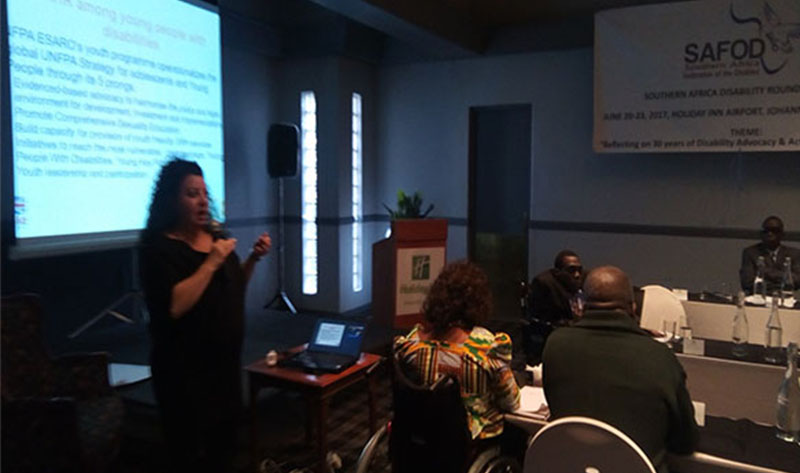|

Participants also reflected on the experiences of partnership for disability issues in Africa specifically taking lessons from the UNFPA SRHR program for young people with disabilities. Ms. Bakaroudis shared experiences from the DFID funded project on the Prevention of Maternal Deaths in East and Southern Africa that contains a component of SRHR among YPWD. The program focuses on Evidenced-based advocacy to harmonize the policy and legal environment for development, investment and implementation, Promote Comprehensive Sexuality Education, build capacity for provision of youth-friendly SRH services, Initiatives to reach the most vulnerable: child marriage, Young People with Disabilities, Young Key Populations, and Youth leadership and participation.
It was noted that whereas young people found challenges accessing youth-friendly services, those with disabilities were more challenged than their counterparts. The vulnerability of YPWD (to sexual abuse, other SGBV, early and unintended pregnancies, HIV/STIs, harmful practices, etc.) increased as they frequently experienced exclusion from sexual & reproductive health information and services. Persons with disabilities were therefore two times more likely to find health care providers’ skills & facilities inadequate, three times more likely to be denied health care, and four times more likely to be treated badly in the health care system (WHO, 2014).
Lack of appropriate data even made it worse for Persons with disabilities. The current data, however, indicated that children and young persons with disabilities were 2-10 times more likely to be out of school than children without disabilities; they were 3-8 times more likely to experience violence; often lacked knowledge about HIV and sexuality; they were sexually active, and they practiced unsafe sex. Yet they could be agents of change and might need assistance.
There was a need for studies to inform regional strategies for resource mobilization for disability. However, as disability issues were getting increasingly ‘trendy’ in light of the SDGs and the “leaving no one behind” maxim; resource mobilization efforts for disability issues faced the same challenges, if not more than other sectors; reduced ‘capacity’ and accountability of DPOs to directly partner with donors; shrinking resources for HIV and other SRH issues; many sectors/causes competing for the resources from the very same donors.
Therefore, in order to maximize the existing funding opportunities DPOs would want to leverage the work of multiple implementers and partners through partnerships, but with strong coordination and clear division of labor. There was also a need to provide evidence and data so as to influence donors.
.
.